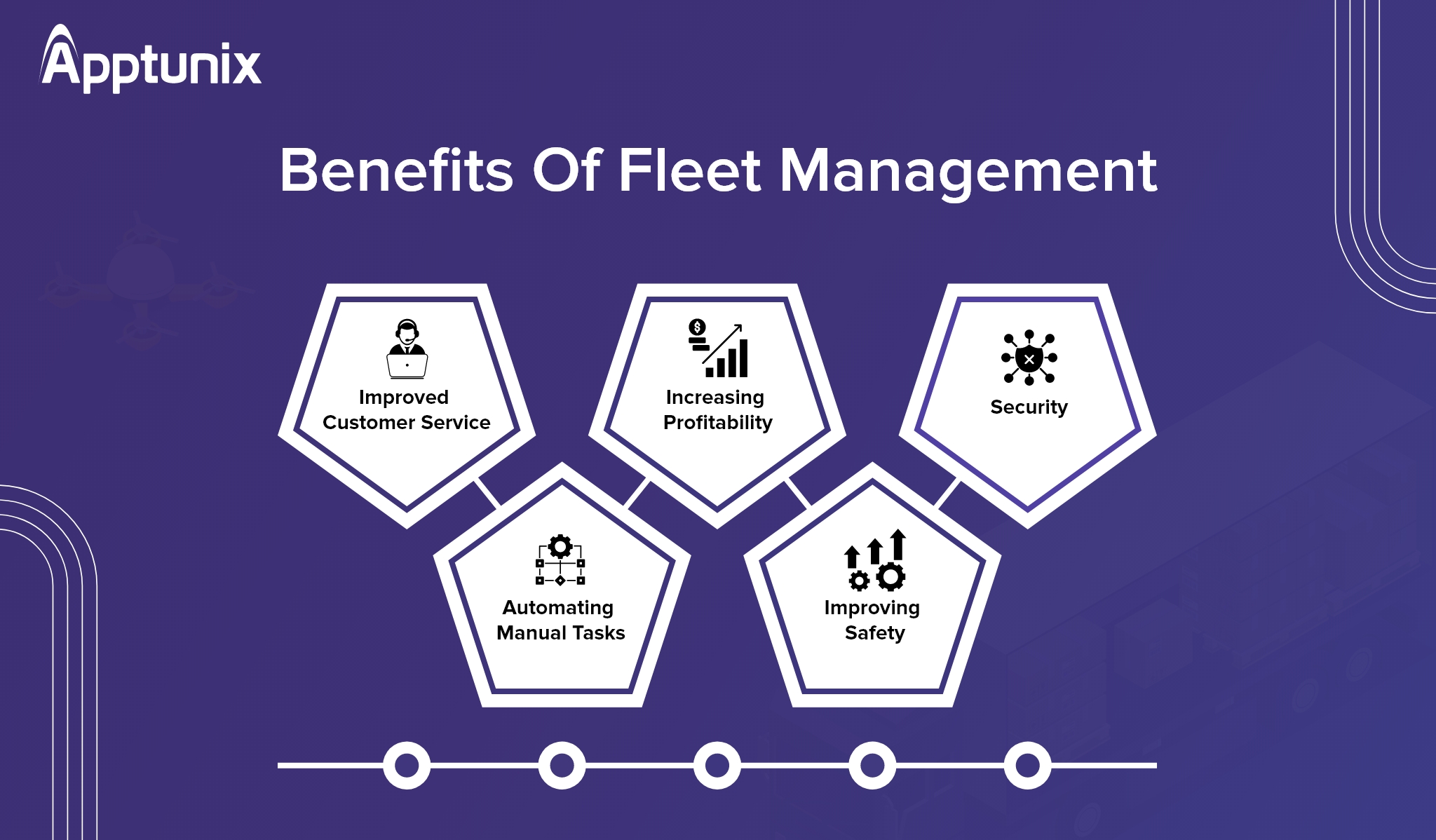Don't miss the chance to work with top 1% of developers.
Sign Up Now and Get FREE CTO-level Consultation.
Confused about your business model?
Request a FREE Business Plan.
Why Fleet Management Is Important- Working and Benefits
Table of contents

Have you ever wondered how you receive your internet orders so quickly? Especially if you purchased anything from Amazon or Walmart? The easy answer to this query is a good fleet management system! This logistics system, more than any other, helps businesses improve delivery while lowering expenses!
When you enter the realm of fleet management, you must look at things in a new light than previously.
According to recent marketing research and advances, The Global Smart Fleet Management Market is predicted to be worth USD 44.5 billion in 2021 and USD 82 billion by 2026, increasing at a CAGR of 13%.
What Is Fleet Management?
Fleet management helps to strengthen efficiency, boost productivity, and improve vehicle and driver safety for an organization’s vehicles and drivers. This is frequently accomplished by a mix of vehicle management, fuel used reporting, driver behavior monitoring, and vehicle maintenance management.
Fleet management is the administration of commercial motor vehicles such as autos, vans, trucks, specialist vehicles (mobile construction machines), forklifts, and trailers. Personal autos used for business purposes
What Is Fleet Management Software?
A unified collection of technologies that helps firms’ vehicle tracking systems and manage a mobile workforce is referred to as fleet management software.
A company that operates commercial trucks has to be able to see what’s going on. A fleet management software program accomplishes this by providing fleet managers with the tools and information they need to successfully and efficiently manage their fleet.
A wide range of businesses utilizes fleet management software to automate operations, cut costs, enhance performance, get real-time visibility into operations, and even comply with regulatory laws.

How Does Fleet Management Work?
A fleet management system is designed to govern numerous types of motor vehicles, such as automobiles, trucks, vans, aircraft, and ships. It carries out the following tasks:
Fuel Management
The secondary issue that management can encounter is a variation in the cost of fuel. The cost of gasoline changes according to market conditions and other external variables. This scenario appears to be a crisis and is beyond the control of management. Regardless of the scenario, he or she must conserve gasoline expenses.
Maintenance Of Vehicles
A fleet management system has a simple search function. This option allows you to quickly locate any asset information. You may narrow down your searches by entering the car’s name, VIN, or even the type of vehicle.
Management Of Field Services
Another essential issue is maintenance. As previously said, a vehicle in the shop is not performing its function, thus appropriate planned and preventative maintenance is critical.
Keeping your fleet in peak shape also protects the safety of your drivers and the general public on the road. However, accidents can occur, and dealing with accident reports and repairs is also part of fleet management. Following an at-fault occurrence, accident management may involve driver safety instruction and disciplinary punishment.
Routing And Optimization Of Routes
Managing route allocation is a difficult undertaking that necessitates careful consideration of several factors. Checking traffic problems, determining driver availability, and avoiding route overlap are just a few examples. It is simple to do using a management platform’s route scheduling capability. Managers may do everything from assigning destinations to drivers to allocating routes.
Tracking Of Assets And Equipment
Asset management is also important. Understanding the lifetime of your vehicles, including when to replace them, saves fleet money on unscheduled maintenance and breakdowns. A recent car may be more efficient, but it is critical to evaluate the overall cost savings on gasoline and maintenance compared to the investment in a new vehicle.
Driver Management
A fleet management system will provide you with information about your drivers’ actions. But it isn’t all. It can also assist you in developing training programs that provide tangible outcomes. Your rate and grade your drivers, then share this information with them so they may see how they compare to other drivers and be incentivized to improve.
A tiny telematics device connected to a vehicle’s onboard diagnostics port is used by fleet management software. While installation procedures vary, many solutions are “plug-and-play” and do not necessitate the services of a professional.
The telematics device gathers vehicle data such as real-time vehicle location, distance traveled, speed, vehicle problem codes, fuel consumption, idling, severe braking, quick acceleration, and so on.
This data is then delivered by cellular connection to an online fleet management dashboard, where it is aggregated into a collection of tools and reports used to track and manage your business.
Also read: 3 Challenges Facing the Logistics Industry and How Software can Help
Benefits Of Fleet Management
Depending on the extent of the organization, there are several advantages to adopting tracking and monitoring technologies. However, the following are the most significant advantages of the fleet management system:

-
Improved Customer Service
The customer rules supreme. According to Bain & Company, increasing client retention by 5% results in a 25% boost in earnings. Furthermore, before making a purchase, 86-95 % of customers research internet evaluations for local companies.
Customers are increasingly using fleet management software to improve their experience. Here are a few examples of how it may assist:
For on-time delivery, route optimization and planning using location history data is essential.
Customers get accurate ETAs thanks to real-time asset tracking.
-
Automating Manual Tasks
Time is business money. Many time-consuming, repetitive tasks can automate using fleet management software. As a consequence, you can able to decrease administrative burdens, save operational expenses, and concentrate more on business growth.
Here are a few instances of how fleet management software can assist with task automation:
It’s no longer necessary to call drivers for ETAs, status updates, or task specifics.
Real-time location monitoring makes it simpler to find assets, trucks, trailers, and equipment.
Paperwork such as proof of delivery, forms, and fuel receipts are collected and centralized.
Vehicle inspection reports, IFTA trip sheets and filings, and Hours of Service administration have all been simplified.
-
Increasing profitability
With the introduction of telemetry software, fleet businesses have seen enormous success. Their return on investment (ROI) and total profitability have both increased significantly. The key reason for this is that these solutions assist organizations in lowering expenses while increasing production.
Automation in everyday operations allows tasks to accomplish more efficiently and quickly. It consistently produces superior outcomes, resulting in increased total profitability.
Monitoring every part of the business aids in the detection of flaws. Managers can correct flaws in the process by using management solutions. It contributes to increased profitability by ensuring that activities are error-free. In every manner, a better-structured process with fewer faults is beneficial.
-
Improving Driver Safety
Keeping drivers safe is a major concern for both fleet management companies and fleet managers. When fleet managers are hundreds of miles away from the moving vehicle, it may well be difficult to verify safe driver behavior.
Fleet managers can use dash cameras or vehicle tracking systems to provide real-time sight into an otherwise remote vehicle tracking and provide proof or materials to perform driver training.
-
Security
Fleet management enhances your fleet’s safety. You must safeguard your valuables when they are on the road. Fleet management, tracking capabilities, and communication channels increase the security of your drivers, vehicles, and deliveries wherever they are.
Bottom Line
As a result, if your company uses commercial vehicles, we can conclude that a fleet management system is necessary. Because it not only helps you enhance productivity, but it also helps you save money. Saving time is especially important in today’s competitive world when firms are trying to stay on top. And what could be better than utilizing a fleet management solution to cover all three?
So, what are you holding out for? Now is the time to get your own fleet management system!

Rate this article!
(4 ratings, average: 4.50 out of 5)
Join 60,000+ Subscribers
Get the weekly updates on the newest brand stories, business models and technology right in your inbox.

You can say, I am an internet surfer. I’m fascinated with marketing and its new trends. With a background in Information Technology, I also like to be aware of the technological advancements around me. Apart from that, you can find me listening to music as I am a huge music lover.

Telemedicine 2.0 - A Comprehensive Guide On What Healthcare Providers Need To Know?
Discover how the latest advancements like Artificial Intelligence in telemedicine are reshaping patient care. This comprehensive resource offers insights into the key trends and innovations driving this shift, providing valuable knowledge for healthcare professionals looking to stay ahead.
Download Now!Take the First Step
Towards Success!
Master app development with a
30-day FREE trial of our premium
solutions.


















